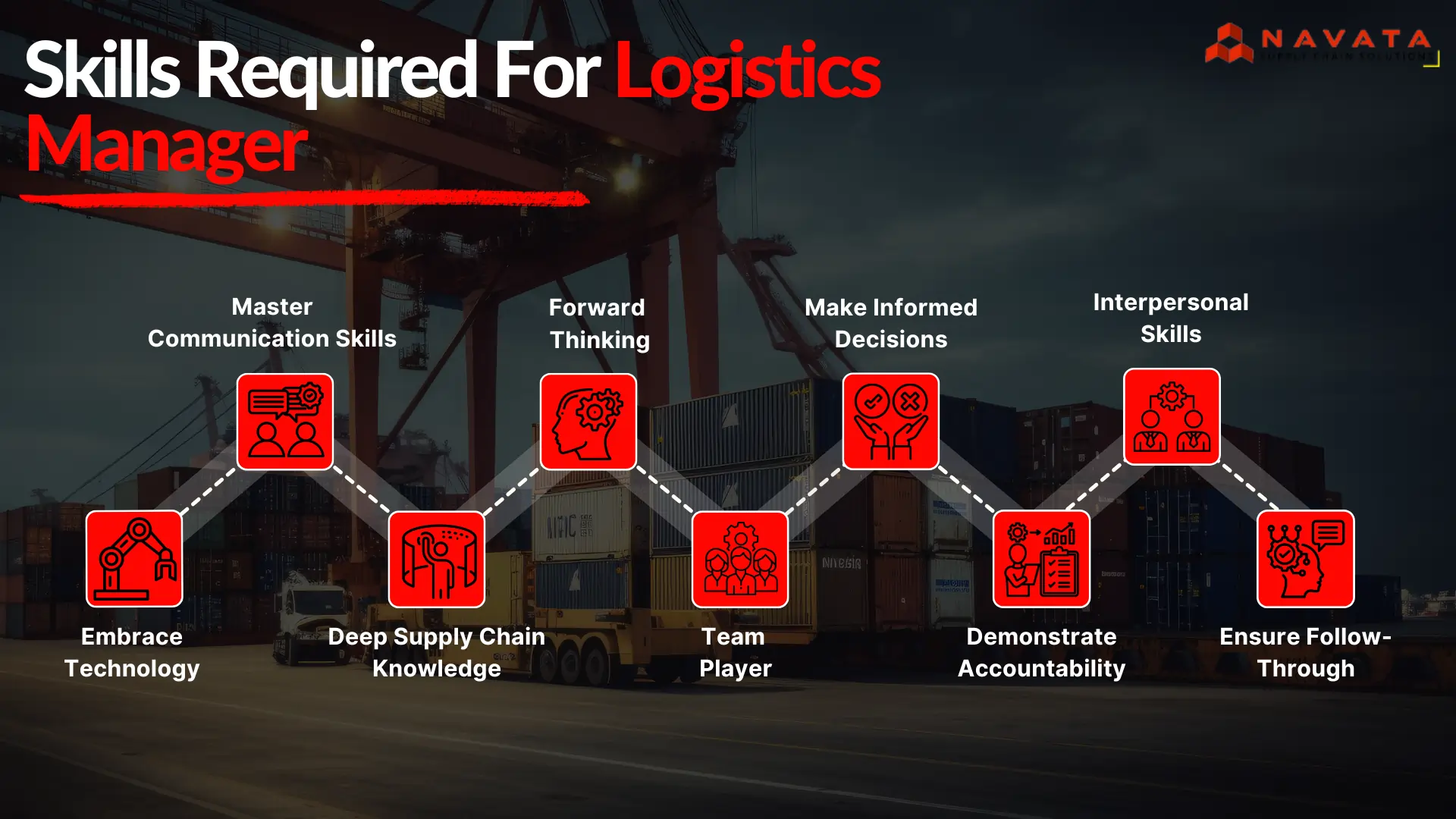This blog discusses the importance of strategic thinking, effective communication, and problem-solving skills in logistics management. It highlights the need for mastery in the dynamic logistics industry to ensure efficient operations and successful supply chain management.
The blog provides strategies to enhance logistics management skills, enabling leaders to navigate challenges, optimize processes, and drive operational excellence in the logistics field.
What is a Job of Logistics Manager?
Logistics managers demonstrate a critical role of being specialists in the movement of materials and supplies. Some of the activities that are supposed to be performed by staff in these positions include the monitoring of the cost of delivery and management of stock. They manage schedules for the effective and efficient delivery of goods and monitor previous performances to correct inefficiencies. The major and proven methods of improving operations include management of resources and the application of logistics software.
Logistics managers plays a central role in developing and negotiating contracts with suppliers, manufacturers, retailers, as well as with the customers for improving the logistics process. They also recruit and manage logistics team therefore nurturing an efficient workforce for the competitive difficulities of today’s supply chain management.

Skills Recquired Today for Logistics Manager
Embrace Technology
Advanced logistics software and tools are crucial for logistics managers in modern supply chain management, enabling real-time tracking of shipments and providing valuable insights through data analysis. These solutions optimize processes, enhance visibility, and drive efficiency. By adopting technology, logistics management can adapt to evolving industry demands and maintain a competitive edge, improving operational accuracy.
Master Communication Skills
Effective communication is crucial for a logistics manager to effectively manage logistics challenges, enhance collaboration, and drive overall success in supply chain management. This includes clearly articulating expectations, developing strong negotiation skills, and maintaining transparency in interactions. By mastering these aspects, logistics managers can effectively manage challenges, secure favorable terms, and resolve issues efficiently.
Deep Supply Chain Knowledge
A logistics manager must have a good understanding of the entire supply chain from procurement to distribution and delivery. This knowledge helps identify bottlenecks and inefficiencies enabling managers to proactive problem-solving and operational efficiency enhancement. It also aids in making informed decisions, optimizing resource allocation, and improving coordination across function. leading to smoother and more effective logistics management.
Forward Thinking
As a logistics manager developing forward-thinking skills is crucial for anticipating company needs and predicting supply chain outcomes. This proactive approach helps identify potential risks, develop contingency plans, and mitigate disruptions. By continuously thinking and planning ahead logistics managers can optimize operations, maintain smooth processes, and align with the “It’s better to be safe than sorry”, positioning the company for long-term success.
Manage Your Logistics Operations!
Team Player
Logistics managers must be team players, recognizing that success is a collective effort. Effective leadership involves allocating tasks, paying attention to team contributions, and acknowledging their hard work. Fostering respectful interactions with other teams enhances collaboration and efficiency. Prioritizing teamwork and mutual respect can build a cohesive, motivated team that drives success in the logistics process.
Make Informed Decisions
Effective decision-making is crucial for managers to navigate supply chain complexities. Being well-prepared and well-prepared allows for informed choices under pressure. This skill can be developed and refined over time through continuous learning and strategic thinking. Continuous learning and application of strategic thinking will enhance decision-making capabilities and improve logistics management effectiveness.
Demonstrate Accountability
A manager’s accountability is crucial for effective leadership. They must take responsibility for mistakes and learn from them, fostering trust and respect within their team. By being transparent and accepting responsibility, they contribute to continuous improvement and the overall success of the company. This approach fosters continuous improvement and contributes to the company’s overall success.
Interpersonal Skills
Strong interpersonal skills are crucial in logistics management for building relationships with diverse individuals, including team members, supervisors, suppliers, and clients. Clear communication and clear connections minimize miscommunication, ensuring smooth operations and collaboration. These skills are essential for navigating logistics complexities and driving overall success in the role, fostering positive relationships and maintaining open, respectful communication.
Ensure Follow-Through
As a manager, it’s essential to follow-through with each component of the supply chain, ensuring every delivery reaches its intended destination. Be involved from start to finish, monitoring progress and addressing issues. Document challenges and develop solutions to prevent future occurrences. Actively managing and learning from each stage enhances effectiveness and problem-solving skills in the logistics industry.
Prioritize Safety and Compliance
Ensuring logistics activities adhere to industry regulations and safety standards is crucial for avoiding legal issues and promoting a safe working environment. Local and international regulations such as transportation, handling hazardous materials and environmental policies should be prioritized. Implementing rigorous safety protocols protects employees and prevents accidents. This not only mitigates risks but also fosters a culture of responsibility and professionalism in logistics operations.

Conclusion
As a logistics manager you’re the master of the behind-the-scenes world of getting goods from point A to point B. But to truly excel in this role you need more than just a knack for organization you need strategic thinking, exceptional communication skills, and the ability to problem-solve like a pro.
As a logistics manager you’re responsible for the day-to-day operations of your organization. That means overseeing stock levels, coordinating deliveries, negotiating contracts, and building a top-notch team. And while it’s a lot to handle, it’s also an incredible opportunity to make a real impact.
So, what can you do to unlock your full potential as a logistics manager? For starters prioritize accountability, interpersonal skills, follow-through and safety. By doing so you’ll not only drive operational excellence but also build trust and credibility with your team, customers, and stakeholders.
Thanks for Reading: How to Be a Great Logistics Manager
Powered By 360Presence

